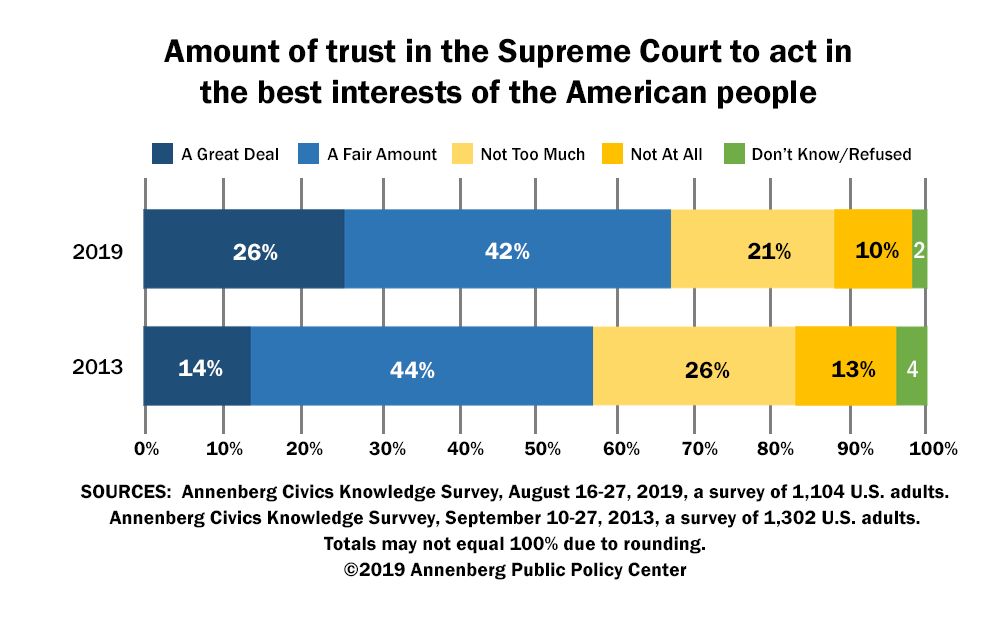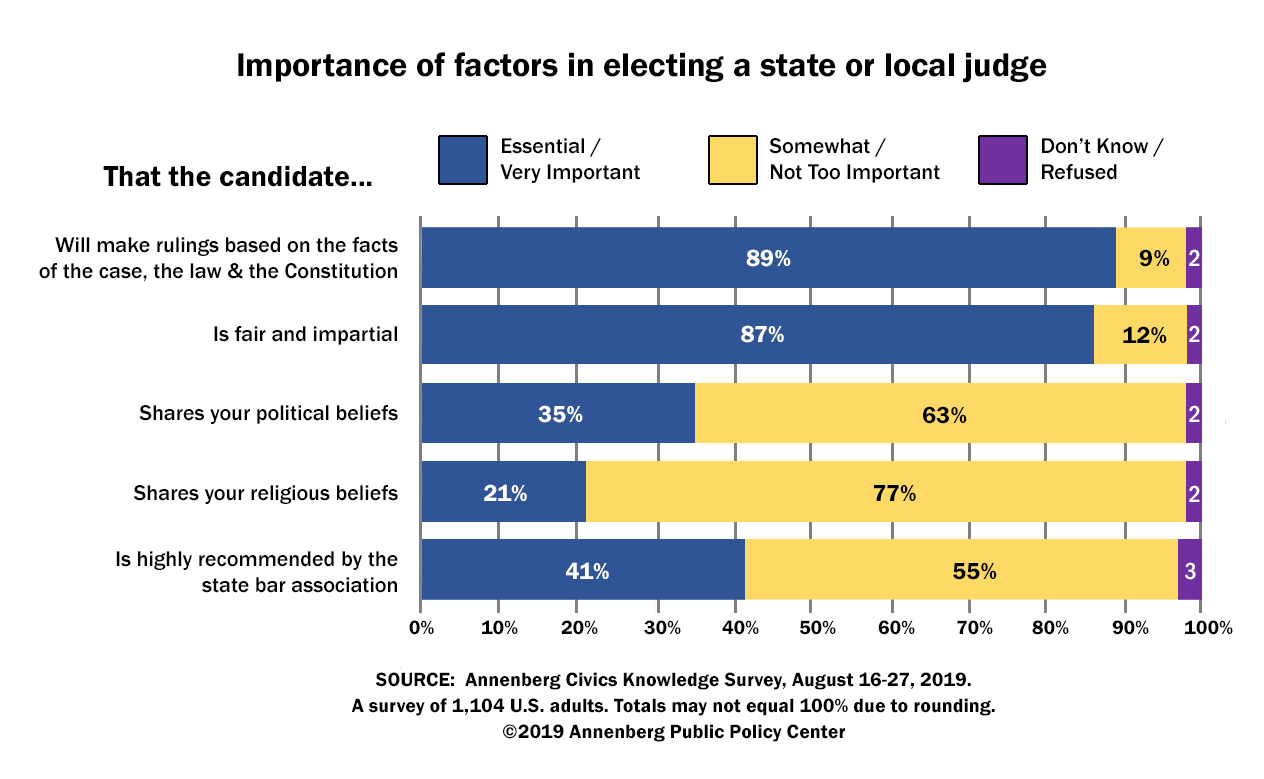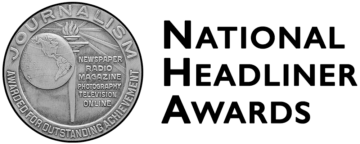Most Americans see the U.S. Supreme Court as a trusted institution, according to the latest Annenberg Civics Knowledge Survey. Two-thirds (68%) of those surveyed trust the Supreme Court to operate in the best interests of the American people, while 7 in 10 (70%) say that that court has “about the right amount of power.”
But the survey also identified troubling signs in how the Supreme Court and the justices are perceived by the public, suggesting that the distinction between judges and elected politicians is becoming blurred. More than half of Americans (57%) agree with the statement that the court “gets too mixed up in politics.” And just half of the respondents (49%) hold the view that Supreme Court justices set aside their personal and political views and make rulings based on the Constitution, the law, and the facts of the case.
“Because the well-being of our system of government depends on the integrity of an independent, impartial, fair judiciary and on the public perception that judges honor these expectations, the persistently high levels of trust in the Supreme Court that we find reflected in Annenberg surveys should be celebrated,” said Kathleen Hall Jamieson, director of the Annenberg Public Policy Center of the University of Pennsylvania. “But the finding that half do not believe that Supreme Court justices set aside their personal beliefs in deciding cases is worrisome.”
The survey of 1,104 U.S. adults was conducted in August for the Annenberg Public Policy Center (APPC) in advance of the Fair & Impartial Judiciary Symposium on October 26, 2019, at the University of Pennsylvania. The event is sponsored by APPC, the Rendell Center for Civics and Civic Engagement, Penn Law, and the Pennsylvania Commission on Judicial Independence. Read more about it here.
Positive views and increased trust in the Supreme Court
The Annenberg Civics Knowledge Survey finds signs that the high court is viewed positively and trusted:
- Two-thirds (68%) have “a great deal” or “a fair amount” of trust in the Supreme Court to operate in the best interests of the American people, including 26% with a great deal of trust, up from 14% in APPC’s 2013 survey;
- 70% say the Supreme Court has “about the right amount of power”;
- Most Americans say the court is not clearly liberal or conservative, with 63% saying it is “sometimes liberal, sometimes conservative depending on the law and facts of the case”;
- Of those who do see the court as generally liberal (9%) or conservative (19%), most say this ideological tilt is bad for our system of government.
Comparing Annenberg surveys in 2013 and 2019, we find that overall trust (great deal/fair amount) in the Supreme Court increased from 58% to 68%, driven mainly by conservatives. From 2013 to 2019, trust in the court among self-described conservatives increased significantly from 50% to 73%. Among moderates and liberals, differences registered in the two surveys were not statistically significant. In the 2019 survey, 71% of moderates and 58% of liberals said they trusted the court to operate in the best interests of the American people.
Understanding the need for fair and impartial judges
Americans have a clear vision of what they value in a judge, the survey found. Respondents were asked to rate various qualities as essential, important, somewhat important, and not too important when electing state and local judges. Americans said they want judges who:
- Make rulings based on the facts of the case, the law, and the Constitution (89% consider it essential or very important);
- Are fair and impartial (87% essential or very important).
In electing state and local judges, Americans consider it less important that judges:
- Share their political beliefs (35% essential or very important);
- Share their religious beliefs (21% essential or very important);
- Are highly recommended by the state bar association (41% essential or very important).
Blurring the line between judges and elected political leaders
The fact that a little over a third of survey respondents consider shared political beliefs essential or very important suggests possible confusion about the role of a judge, noted Jamieson.
“Chief Justice Roberts famously said, ‘We do not have Obama judges or Trump judges, Bush judges or Clinton judges,’” Jamieson noted. “Our findings suggest that a notable percent of the population believes that the decisions of justices are politically aligned with the ideology of the president who nominated them.”
Indeed, 2 in 5 people (41%) feel that Supreme Court justices nominated by Democratic presidents are more likely to make liberal rulings, and justices nominated by Republican presidents are more likely to make conservative rulings, regardless of the Constitution, the law, and the facts of the case.
Protecting the Supreme Court from interference
The survey also found that:
- 77% of Americans disagree with the idea of abolishing the Supreme Court if it started making a lot of unpopular rulings;
- More than half of Americans (57%) disagree with curtailing the right of the Supreme Court to decide “certain types of controversial issues”;
- Americans are about evenly divided (48% agree vs. 47% disagree) on whether the Supreme Court should be made less independent so that it “listens a lot more to what the people want.”
“Any evidence of public willingness to restrict the independence of the judicial branch should raise alarm,” Jamieson said.
The Annenberg Civics Knowledge Survey, under the supervision of Ken Winneg, Ph.D., APPC’s managing director of survey research, was conducted August 16 to 27, 2019, for the Annenberg Public Policy Center by SSRS, an independent research company. Interviews were conducted with 1,104 U.S. adults, ages 18 and older. The margin of error was ±3.6 percentage points. For more information, download the Appendix.
Download this news release here.




